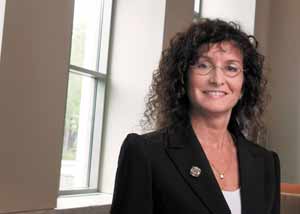A closer look at Virtual Reality Exposure Therapy for PTSD

Emory Healthcare Veterans Program
Throughout history, albeit classified by different names like “soldier’s heart,” “shell shock” and “combat exhaustion,” combating the symptoms of post-traumatic stress disorder (PTSD) has been a struggle for veterans, their families and friends, as well as clinicians.
One of the primary symptoms exhibited by PTSD patients includes reliving a traumatic event, whether through nightmares or sensory triggers like sights, sounds or smells. Another hallmark symptom is avoidance, not only of situations that trigger these reminders, but also of the symptoms themselves.
“It’s the nature of the beast,” said Dr. Barbara Rothbaum, director of the Emory Healthcare Veterans Program in Atlanta. “If we can’t get the patients to go there—to go to the event—we can’t get them to think about it differently.”
Breaking through situational avoidance and the fear of returning to the scene of the event is at the core of a rather new and potentially underutilized treatment for veterans suffering from PTSD.
Virtual Reality Exposure (VRE) is an evidence-based treatment for PTSD being used at various health clinics throughout the country, and it’s showing encouraging signs of success.
Dr. Kathleen M. Chard is a clinical psychologist with the Trauma Recovery Center at the Cincinnati VA Medical Center and has been a mental health provider for more than 20 years. Of her patients using VRE therapy—most of them Vietnam veterans—70 percent no longer show PTSD symptoms after seven to 15 sessions, she said. The remaining 30 percent continue to show improvement.
The trick with VRE therapy, much like other treatments, is getting individuals who may be suffering from PTSD in the door to discuss their options when seeking assistance with mental health professionals.
“We want to remove the stigma associated with seeking help,” said Chard. “The goal of Virtual Reality Exposure therapy is to help veterans process the traumatic memory so it no longer controls their life.”
The key to reprocessing the memory is creating a scene as close as possible to the memory itself.
“We set up the exposure to directly mirror the real scene,” said Rothbaum.
For example, there are specific Iraq and Afghanistan models for VRE therapy. In an immersive 360-degree world, the therapy strives to accurately hit on all five human senses when recreating the event. Clinicians can insert particular smells, certain sights and any sounds into the virtual experience.
This realistic recreation, experienced in a controlled environment, is helping doctors reshape the way a veteran thinks about the event.
“The VRE treatment allows us to trigger memories about the event to obtain the full story,” said Chard. “Once these memories are triggered, we can challenge those misperceptions in the veteran’s mind, including areas where they may be blaming themselves for things they could not have controlled or predicted. It allows them to process the emotion.”
VRE therapy procedures follow standard evidencebased protocol for Prolonged Exposure therapy, which has scientific evidence supporting its therapeutic effectiveness. With Prolonged Exposure therapy, patients are able to re-experience traumatic events by repeatedly visualizing and processing the situation, or by confronting certain situations or objects that evoke distress but present no actual harm, such as the sound of a car backfiring. This form of therapy helps patients gradually diminish their avoidance of certain triggering stimuli, as well as symptomatic avoidance that often makes PTSD sufferers hesitant to seek treatment in the first place.
“It just festers,” said Rothbaum. “You don’t have the opportunity to change it. I am a believer in the resilience of the human spirit. This is a message of hope. It takes courage. Being brave is doing something when you’re scared.”
Simply put, VRE therapy attempts to “reboot” the patient’s coping abilities, strip the distressing stimuli and empower veterans with a safer and proportionate response.
“I wouldn’t still be doing this if I hadn’t seen it work,” said Rothbaum, who has conducted numerous case studies on the treatment. “We want [patients] to have one foot there and one foot here during the sessions. It’s common sense—when you’re afraid of something you have to deal with it head on.”
“It’s a little like going to the dentist—nobody wants to go, but it’s a matter of taking care of yourself,” Rothbaum added. “It’s also a short-term treatment. In just a little time you can make a lot of changes.”
The current generation of young service members and veterans, many having grown up with digital gaming technology, may actually be more attracted to and more comfortable with participation in a technology-based VRE therapy program. This could lead to an increased number of veterans suffering from PTSD seeking help and accessing care.
According to a psychological study done by Dr. Jaime Wilson, Madigan Army Medical Center in Tacoma, Wash., 325 active-duty service members from the Iraq and Afghanistan wars were surveyed, and 83 percent of the participants reported they were open to using some technology as a part of their treatment. Seventyone percent were equally willing or more willing to use a treatment based on technology than to merely talk to a therapist in a traditional setting. Perhaps most interesting was that 20 percent of service members who stated they were not willing to seek traditional psychotherapy rated their willingness to use VRE therapy as neutral to very willing.
One interpretation of these findings could be that service members who are not willing to seek help in a traditional therapeutic environment will seek the help they need in a technology-based treatment like VRE therapy, thus creating and offering an appealing treatment option for a more “digital” generation of veterans.
“We are seeing positive results stemming from a platform that is very familiar to many veterans,” said DAV National Adjutant Marc Burgess. “We encourage any and all veterans from any era experiencing mental health issues or PTSD symptoms to talk to their health care provider and explore all treatment possibilities, including VRE.”






